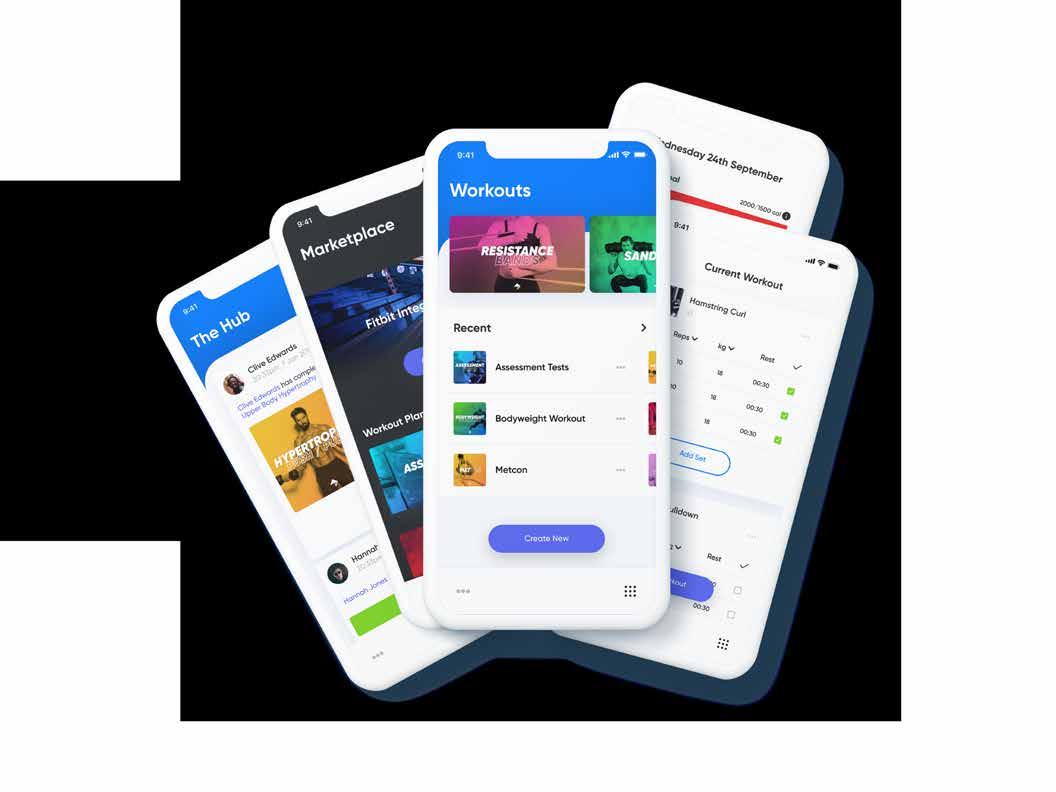
7 minute read
matt ford
by PT Today
DONT FORCE YOUR FITNESS IN 2020
– MATT FORD
Advertisement
With so much information now readily available about how short-term fixes aren’t the best solution for your diet, and quick fixes such as magic teas, or restricting calories to super low levels don’t work. We are forever being advised to take on an approach that is sustainable to create, or form new habits that could be with us for life and not just for periods of our lives.
It does make me wonder though why we still do the exact same thing when it comes to our fitness, especially at this time of the year. We get the urge to jump back into the gym, or buy into the latest trend by sitting on a bike in front of a screen, smashing out a workout into every spare minute of the day we can find. This kind of dedication and determination is admirable until we spend the next 3-weeks of the month complaining about an injury we have picked up, or the severe muscle soreness we experience every time we get up off the sofa or walk down the stairs. It’s then that we realise that this kind of intensity isn’t sustainable. It is akin to the crash dieting that seemed like such a good idea at the time until a few days later when I’m moody, irritable, hungry, lacking in energy, and tired all the time.

So why all of a sudden are we ok to accept that playing the long game with our nutrition is ok, but not with our fitness? I have to laugh when I hear people ask about gym memberships and say things like, “I don’t want to be tied in for 12 months”, or “do you do 3-month memberships”. If you believe that you are going to go to the gym for 3-months, what are you going to do in the 4th? Or what about, “I’m buying into the 12-week challenge, I’m going to transform my body in the next 12 weeks”, what happens in week 13, 14, 15?
Stop making the grand gesture that is often empty and realise that ‘Consistency Trumps Short Term Intensity’ in pretty much everything you do. You need to start to realise that it doesn’t matter what you do, it’s going to be more about how long you do it for. Think about the people in the gym who have the physique that you are aspiring to, and then ask them how long they have been working out for - I’ll bet you the answer isn’t 12 weeks. On the odd occasion that they have been ‘cutting up’ for 12 weeks, they usually like to tell you that they have been training for years though to get like they do. It’s the same with anything in the gym, the person who’s slaying the rest of the spinning class just so happens to be there every time you are.
Overall, look at the long game. Look at a way to keep you focused over a long-period of time in order to give yourself the time to create a habit out of the gym, without the pressure and stress of diving into a high intensity short fix routine. And if you can’t go for some reason or you miss a class, so what? The world isn’t suddenly going to end and you’re not going to lose all your gains either.
Create an environment that is always changing, even die-hard athletes fall out of love with the ‘game’ due to the repetitive nature of doing the same thing over and over. I guarantee that the threshold for an everyday athlete is a lot less than what theirs is. So, sitting on your bike in front of the TV screen may be great for 3 months, 6 months - but what is that experience going to be like in 12, 18 months? Are you still going to be ready to strap yourself into the pedals? Some will, but a lot won’t.
Molly Galbraith put it perfectly, “It doesn’t matter if you don’t get to the gym today, it really doesn’t even matter if you get there tomorrow. What matters is that you’re still in the gym 20 years from now”.
2020 should be about finding your fitness and not putting stress on yourself to overly commit. Consistency will come, just don’t force it.
www.archon-app.com
Excel with on demand fitness education

With over 200 courses available covering a variety of topics from Personal Development and Business Growth to Anatomy and Programming, health clubs and trainers can develop their skills to provide members and clients with the best possible exercise experience whilst also enjoying the following benefits;
• Upskill staff anytime, anywhere • Accelerate learning with 10 minute interactive modules • Standardise skills to enable competency across the business • Develop soft skills to improve customer engagement • Keep up-to-date with industry trends and insights
All relevant modules are aligned with current Level 2 and 3 qualification standards.
For more information and a full list of pathways visit edt.education
HOW THE PT INDUSTRY HAS CHANGED IN A DECADE

– KATIE BULMER-COOKE

Multi-Skilled In order to be a successful PT, it is no longer enough to simply be just a great trainer. You also have to be clued up on social media, web design, sales, accounts and business planning all rolled into one.
The fitness industry is almost an entirely different space by comparison to when I first donned my head mic and taught a few grapevines and star jumps to a room full of Lycra-clad ladies back in 2002.
This doesn’t mean that anyone should be discouraged from jumping in with both feet as there is also more opportunity than ever before. Back when I started, you either worked on the gym floor as an instructor or PT, or you went down the group fitness route and taught classes. Once you had made your choice, you then worked for 40+ hours per week, had a cap on your weekly earnings due to hours in the day and that was it, before eventually getting knackered and perhaps looking at lecturing or management options.
Thanks to social media and the internet there are so many opportunities, from online coaching and digital products to creating/ launching your own merchandise range and small group training models. To be successful in today’s fitness industry, I believe you need to be 3 things; a specialist, diverse and multi-skilled. Specialist In order to stand out in this crazy industry, it’s important to have a specialism and a key area of knowledge that will help position yourself as an expert. Gone are the days of having a PT profile that lists all of your many qualifications and courses you’ve attended. Instead focus on those that are most relevant to the niche you want to specialise in. After around a year or so of being a PT, I took the decision to specialise in training women and most specifically pre and post natal women.This is exactly how I’d encourage others to find their niche - choose a niche you resonate with. Diverse Within your chosen niche, it is important to be diverse, and think about the range of products and services you can offer. Using pre and post natal clients as an example again, I offered 1-1 PT sessions, small group training, group fitness classes, online workouts and I even sold the same foam rollers and resistance bands that I used in sessions, so that clients could replicate the workouts, and follow their plans at home. This allowed me to work with clients who had varying budgets. This won’t happen overnight but it certainly is achievable. You just have to put some time, effort and energy into educating yourself in some areas that may initially feel outside of your comfort zone.
The fitness industry may be growing at a rapid rate, but there has never been more opportunity within it. Though, it may be a while since I last wore my head mic and taught a group fitness class, I’m still using my fitness skills and knowledge everyday as I work on building online fitness brands and businesses and creating content for celebrities, sports personalities and social influencers.

It just goes to show that the skills we gain as fitness professionals are so valuable and have the power to take us on exciting career journeys.










